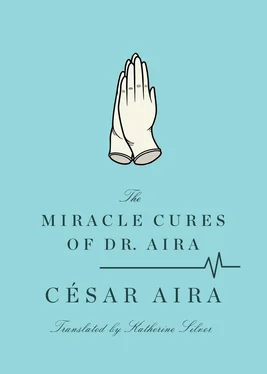César Aira
The Miracle Cures of Dr. Aira
One day at dawn, Dr. Aira found himself walking down a tree-lined street in a Buenos Aires neighborhood. He suffered from a type of somnambulism, and it wasn’t all that unusual for him to wake up on unknown streets, which he actually knew quite well because all of them were the same. His life was that of a half-distracted, half-attentive walker (half absent, half present) who by means of such alternations created his own continuity, that is to say, his style, or in other words and to close the circle, his life; and so it would be until his life reached its end — when he died. As he was approaching fifty, that endpoint, coming sooner or later, could occur at any moment.
A beautiful Lebanese cedar along the verge of a pretentious little street lifted its proud rounded crown into the pinkish-gray air. He stopped to contemplate it, overwhelmed with admiration and affection. He addressed it in pectore with a short speech that combined eulogy, devotion (a request for protection), and, oddly enough, a few descriptive features; for he had noticed that after a time, devotion tended to become somewhat abstract and automatic. In this case, he noticed that the crown of the tree was both barren and leafy; the sky could be seen through it, yet it had foliage. Standing on his tiptoes to look more closely at the lower branches (he was very nearsighted), he saw that the leaves, which were like small, olive-green feathers, were partially coiled around each other, it was the end of fall, and the trees were struggling to survive.
“I honestly don’t believe that humanity can continue much longer on this path. Our species has reached a point of such dominance on the planet that it no longer has to confront any serious threat, and it seems that all we can do is continue to live, enjoying what we can without having to risk anything. And we keep moving forward in that direction, securing what is already safe. With each advance, or retreat, no matter how gradual, irreversible thresholds are crossed, and who knows which we have already crossed or are crossing at this very moment. Thresholds that could make Nature react, if we understand by Nature, life’s general regulatory mechanism. Maybe this frivolity we’ve achieved has irritated Her; maybe She cannot allow one species, not even our own, to be freed from its most basic needs. . Of course I am personalizing this quite perversely, reifying and externalizing forces that exist within us, but it doesn’t matter because I understand myself.”
Such things to say to a tree!
“It’s not that I’m prophesying anything, especially not catastrophes and plagues, not even subtle ones, no way! If my reasoning is correct, the corrective mechanisms are at work within our present state of well-being and as a part of it. . I just don’t know how.”
He had started walking and was already at some distance from the tree. Every now and then he would stop again, and with a look of deep concentration he would stare at some random spot in his surroundings. These were abrupt stops, which lasted about half a minute and did not occur with any discernible regularity. He alone knew what they were in response to, and it was improbable that he would ever tell anybody. They were stops of embarrassment; they coincided with a memory, which emerged out of the folds of his idle digressions, of a blunder. It wasn’t as if he enjoyed these memories, on the contrary; he simply could not prevent them from rising suddenly in his mental tide. And such an appearance was powerful enough to paralyze his legs, make him stand still, and he would have to wait for a fresh impetus to start walking again. Time lifted him out of the shame of the past. . It had already done so; it had already carried him into the present. Such blunders were cessations of time, where everything coagulated. They were mere memories, stored away in the most impregnable of safe boxes, one no stranger could open.
They were small, ridiculous, and perfectly private disgraces — a moment of awkwardness, a faux pas, which had affected nobody but himself; they had made strong impressions on him, clots of meaning that blocked the flow of events. For some reason, they were irreducible. They resisted translation, such as a transfer to the present. Whenever they appeared, they paralyzed him in the middle of his somnambulistic activities, which is what would bring them out of their labyrinthine lair of the past. The more he walked, the greater the chance that he would catch one, against his will. This turned his endless strolls into trajectories through the bifurcated maze of his youthful past. Perhaps, after all, there was some kind of regularity that drew a pattern through space-time, these cessations creating an empty distance. . But he would never be able to find a solution to his strange theorem if he couldn’t explain why his steps stopped whenever a memory of this kind made its appearance; standing still and staring at one spot could be explained as an attempt to dissemble, perhaps pretend that this spot interested him so much that he had no choice but to stop. But the cessation in itself, the relationship between the blunder and paralysis, remained obscure, as long as he did not resort to psychological interpretations. Perhaps the key could be found in the very nature of those embarrassing moments, in their essence or common denominator. If that were the case, what was happening was a repetition compulsion in its most purely formal aspect.
Digging deeper into the issue, of course, was the fact that these blunders had occurred. They happen to everybody. They are the inevitable result of sociability, and the only solution is to forget. Truly, the only one, because time doesn’t go backwards, so they cannot be fixed or erased. And because he could not depend on forgetting (he had the memory of an elephant), he had taken recourse in solitude, in almost complete isolation from his fellows, in this way guaranteeing at least the minimization of the effects of his incurable awkwardness, his bewilderment. And his somnambulism, which existed on a different level of his consciousness and his intentionality, should move in the same direction, like an a posteriori redemption, if in fact a somnambulist acted with the elegance of perfect efficiency.
To be honest with himself, he had to admit that blunders were not the only issue; the common denominator actually was spread along a rather sinuous path, which turned out to be not so easy to follow. Or perhaps one had to broaden the definition of a blunder: it could also include small infamies, acts of stinginess, accounting errors, cowardice; in other words, anything that feeds retrospective and private shame. And it was not as if he blamed himself (though during those stops a voice inside would shout: “What an idiot! What an idiot!”), for he had admitted they were inevitable at the moment they had occurred. At least he took comfort in their insignificance, for they had never been crimes, nor had there ever been any victims other than his own self-esteem.
In any case, he had promised himself they would never happen again. To achieve this he didn’t need to do anything but remain alert and avoid precipitous behavior, always acting within the rules of honor and a proper upbringing. In his practice as a miracle healer, a blunder could have dire consequences.
In a novel, blunders are set up with great deliberation, with ingenuity and care, which is quite paradoxical, for it turns out to be more natural and spontaneous to write a scene in which everybody behaves properly. Dr. Aira equated every act that was morally, intellectually, or socially wrong with an act of violence, one that left a scar on the eminently smooth skin of his ideal behavior. He was one of those men who could not conceive of violence.
Читать дальше












